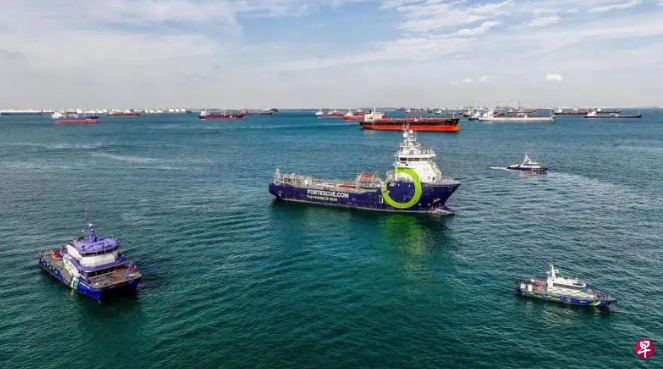The trade war is intensifying! Marine fuel sales fell in Singapore
The intensifying trade war has helped marine fuel/bunker sales in Singapore, the world's largest ship refuelling port, slow from a peak last year to a 20-month low in February.

As reciprocal tariffs announced by the United States may lead to the global fear of a trade war, experts and scholars surveyed expect that global demand for Marine fuel oil will continue to fluctuate and will be flat or possibly weak this year.
According to the Maritime and Port Authority of Singapore (MPA), Marine fuel oil sales in Singapore hit a record high of 54.92 million metric tons in 2024.
However, Singapore's Marine fuel oil sales in January and February fell 9.1% and 8.1% year-on-year to 4.46 million metric tons and 4.15 million metric tons, respectively.
On the other hand, the number of tankers in February fell 14.1 per cent month-on-month to 3,075, the lowest in two years, and 8.5 per cent year-on-year. In January, the number of tankers increased slightly by 1.0% month-on-month to 3580.
If Marine fuel oil sales for the rest of the year remain at the level of the beginning of the year, full-year Marine fuel oil sales are estimated to decline 5.6% to 51.42 million metric tons.
Associate Professor Yuan Jinhui from Nanyang Technological University's (NTU) School of Civil and Environmental Engineering told Lianhe Zaobao: "The Sino-US trade war is definitely one of the reasons for the decline in Marine fuel oil sales in Singapore. Since shipping demand is derived from global trade activities, any disruption or disruption of trade flows (such as tariffs or other trade barriers) will have a negative impact on vessel utilisation. When shipping activity decreases, especially on major routes involving China and the United States, the demand for Marine fuel oil in major hubs such as Singapore will naturally decline."
He then pointed out that the trade war has a direct and indirect impact on Marine fuel oil demand. The immediate impact is that tariffs reduce the volume of trade between China and the United States, leading to fewer trans-Pacific voyages. The indirect impact is that it creates uncertainty in global supply chains, affecting charter decisions and shipping schedules.
US President Donald Trump signed an executive order on "reciprocal tariffs" at the White House on April 2, announcing that the United States will impose a "minimum benchmark tariff" of 10% on trading partners, and impose higher tariffs on some trading partners.
In a statement released Thursday (April 3), WTO Director-General Ngozi Okonjo-Iweala said the U.S. tariffs would have a significant impact on global trade and economic growth prospects, with the overall volume of global goods trade shrinking by about 1 percent in 2025.
Commenting on Singapore's fuel oil market prospects, Mr Yuen said the ongoing crisis in the Red Sea region had led many shipping companies to circumnavigate the Cape of Good Hope, lengthening voyages and increasing fuel oil consumption. This has helped to mitigate the sharp decline in fuel oil sales in Singapore.
Looking ahead to the full year, he said: "Marine fuel oil demand in Singapore is likely to remain volatile and potentially softer throughout the year this year, impacted by subdued global trade sentiment, cautious shipping operations and a gradual shift towards cleaner fuels." However, Singapore is well positioned to adapt with its superior infrastructure, digitalisation and early investment in green fuel oil."
Premasish Das, head of oil market downstream research at S&P Global Commodity Insights, expects global demand for Marine fuel oil to be flat this year compared with last year.
"The chaos in the Red Sea continues to support Marine fuel demand and is likely to continue unless continued peace in the Red Sea region gives operators confidence," he said.
声明:转载此文是出于传递更多信息之目的。若有来源标注错误或侵犯了您的合法权益,请作者持权属证明与本网联系,我们将及时更正、删除,谢谢。
2025-04-09来源:联合早报
Recent news

The trade war is intensifying! Marine fuel sales fell in Singapore

Boat, boat, boat! More than 60 new ships are under construction in Shanghai's three big Ships

Will the US impose 60% tariffs on all Chinese goods? Response of the Ministry of Foreign Affairs

Maersk set up an international transshipment center in Lingang, Shanghai

"Sea Hercules" and new Chinese ships Hudong China opened a new beginning of the New Year ship delivery

More than 500 ships! Ningde time on board

Swim upstream! Chinese shipping company to carry out Red Sea express


